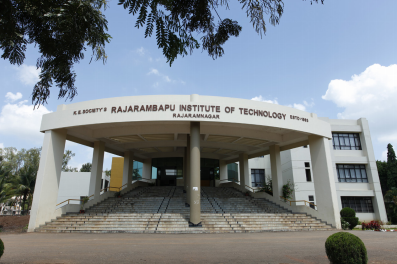– Article by Sheetal Sohoni.
Rajarambapu Institute of Technology (RIT), formerly known as College of Engineering Sakhrale is one of the oldest consortium member institutions of IUCEE. The college was started in 1983, and is located near Islampur, a small town in western Maharashtra. RIT can serve as a model for other institutions that might be struggling with the issue of being located in a remote rural area.
RIT has used its remote location to attract students from local areas, and has developed an environment for providing solutions for local issues and problems. Thus, students are not only able to empathize, but also come up with solutions that are relevant, cost effective, and easy to adopt. The institution understands the importance of retaining talented faculty, and therefore has created an ecosystem that supports future growth through supporting further education of faculty and staff.
RIT has achieved autonomous status, and has created an environment for academic excellence under the able guidance of Director Dr. Sushma Kulkarni. Sushma believes in action, and is always ready to listen to new ideas. Her imperturbable personality makes her a great leader. Sushma came in contact with IUCEE in 2006. According to her, faculty at RIT were involved in student centered learning even before the institute came in contact with IUCEE, but it was based on plain simple logic. Now, through exposure to various IUCEE initiatives, the teachers have adopted the philosophy as a science, based on research and empirical evidence.
The institute has adopted the concept of project-based learning. The four-year undergraduate engineering program is designed in such a way that the students get to learn and adopt the design process right from their first semester. In the first year students get a chance to connect to the community, in the second year the focus is on environment solutions. The third year emphasizes core subject solutions, and in the final year students come up with a prototype for the problems they have studied through out their academic journey. RIT also helps the students in improving their communication skills (both verbal and written) through language proficiency courses. The institute offers other languages like German and Japanese too. The progression helps the students to develop professional skills along with the technical skills. A great way to prepare future engineering minds!
Satyajit Patil, Associate Professor and Head of the Department of Mechanical Engineering at RIT suggests that, “Teaching is my passion and research helps in improving the teaching, and both go hand in hand”. Satyajit has seen growth in students’ interest in technical subjects because of the active learning process in the classroom. Patil also discussed how faculty at RIT have used tools like open book exams, assignments in native language, and group assignments to improve students’ learning and writing skills. Satyajit wants himself and his students to be recognized as competent professionals in their respective fields, and he promotes this philosophy in his classroom.
RIT in conjunction with IUCEE publishes a journal on engineering education called the Journal of Engineering Education Transformations (JEET). JEET was an initiative started by Dr. Ratnalikar in the nineteen eighties, and was carried forward by Dr. Sushma Kulkarni with support of able faculty of RIT. The journal is subscribed by 214 (individual and institutions). Dr. Hemlata Gaikwad professor at RIT, manages JEET for the institution. Hemlata is another bright mind working at RIT. She wants to be known as an educator and has participated in webinars conducted by IUCEE. She has done extensive study in “self efficacies of engineering education undergraduate girl students”. She also discussed about the “Sharda Nyas” initiative of RIT for girls students. All the programs and events hosted by “Sharda Nyas” are for girls, and are run by girls. A great platform for creating equal opportunities for girls indeed!
There are two kinds of institutions: Those that take actions, and those that wait for others to take actions. Rajaram Bapu Institute of Technology belongs to the first category. They took steps to cultivate the institution as a renowned engineering institution not only in India, but in the world too. And students studying from Jammu and Kashmir, Sudan, and Kenya are testimony for this claim. There are around 21 international students studying at RIT. A great institution with bright ideas!

